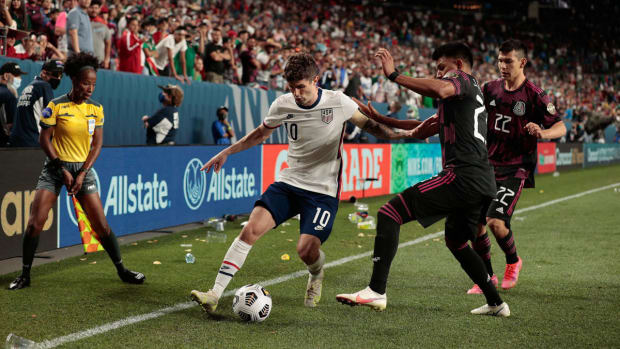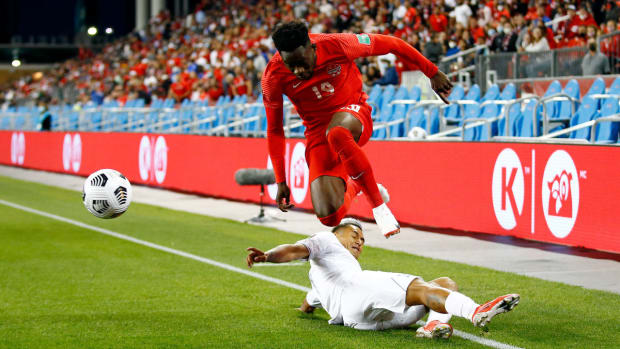Despite a run of good results and a trophy-filled summer, consistent scoring has been lacking for the U.S., and a home World Cup qualifier vs. Canada is the time for it to change.
NASHVILLE, Tenn. — Johan Cruyff famously said, “Quality without results is pointless. Results without quality is boring.”
It’s always been apparent that, in soccer, especially in settings where games are almost guaranteed to be tight, you can have one without the other. Small moments or random bounces can shape the 90-minute picture. One incident can eclipse a trend. Quality doesn’t always lead to a result, and a result isn’t a necessary consequence of quality.
In the end, of course, boring results are more desirable than pointless quality. That’s especially true in World Cup qualifying, where only the scoreboard matters. There are no style points in Concacaf. On Thursday night in El Salvador, the U.S. men’s national team took its first step down the tricky road to Qatar with a 0–0 draw. It wasn’t a bad result, but it wasn’t a very good performance.
Considering the context—the Americans’ qualifying inexperience, the travel and brief build-up, the conditions and the deliriously imposing atmosphere inside the Estadio Cuscatlán—the U.S. will take the point and move on without drawing any pessimistic conclusions. Three of the four matches on the Octagonal’s opening night ended level, and the U.S. (0-0-1) is in fine position with 13 games to go (the double round-robin’s top three finishers qualify directly to the World Cup while the fourth enters an intercontinental playoff).

Alex Peña/Getty Images
But the expectations and stakes rise on home soil—two home defeats doomed the U.S. during the 2018 cycle. Home is where the conditions and circumstances should be near ideal, where distractions are minimal and excuses invalid. It’s where results are vital. And while the score in a given game may not depend on quality, as Cruyff implied, they’re probably linked over time. Good performances increase the likelihood of good results.
And so the Americans can’t afford to rely on bounces or small margins at home. On Sunday night against Canada (0-0-1), which is hurting following a home draw against Honduras, the U.S. has to play better. It can’t afford to drop points with a match at Honduras (Sept. 8) around the corner. It has to show it can rise to the occasion and produce a commanding performance at home—a performance that leaves almost no doubt about the result.
“Our intention on Sunday is to win the game. That’s what we want to do and I don’t think the result of Thursday night [in El Salvador] changes that at all. … Home games in World Cup qualifying, you want to win. That goes without saying,” coach Gregg Berhalter said Saturday evening. “Now it’s a home game. We get to play in front of our fans. These are the moments we’ve been waiting for.”
The U.S. obviously would get a welcome boost if forward Christian Pulisic was able to play against Canada. The Chelsea star and UEFA Champions League winner missed the trip to El Salvador while returning to fitness after testing positive for COVID-19 and a subsequent 10-day quarantine in England. Berhalter said Saturday before the U.S. trained here at Nissan Stadium that Pulisic was still being evaluated and that his availability for Sunday remained uncertain.

Isaiah J. Downing/USA TODAY Sports
“He’s made some progress and we have to see if it’s enough to actually include him in the [23-man] gameday squad and play,” the manager explained. “We’ve been getting him up to speed with training. We’re trying to see what he can tolerate, see what type of workloads he can do and I think that’s the first step. To be out for 10 days and have COVID isn’t the easiest thing to get over. So for us it’s about really seeing how he can come back in a safe way. That’s the most important thing. We’ve been having conversations. We’ve been asking him how he’s tolerating loads and everything. We’ll see if he’s ready.”
Konrad de la Fuente started in Pulisic’s customary spot on the left wing against El Salvador. Pulisic fully participated Saturday in the portion of training open to the media, which consisted of warmup exercises.
Berhalter also revealed that goalkeeper Zack Steffen (back spasms) will remain sidelined on Sunday. Matt Turner likely will get another start. The New England Revolution netminder has yielded just one goal, on a penalty kick, in eight U.S. appearances and had one save in El Salvador.
Elsewhere, Berhalter will have to consider including some fresh faces for the second qualifier of three in seven days. Center back John Brooks will almost certainly start after Tim Ream and Miles Robinson ably anchored the defense in San Salvador. But Berhalter could decide to go with four in the back or three, depending on whether he opts for the U.S.’s more prevalent look (four) or decides to match Canada’s (three). Canada wingers Alphonso Davies and Tajon Buchanan can cause significant problems out wide, and the U.S. struggled in those areas Thursday—especially with Sergiño Dest deployed on the left.

Vaughn Ridley/Getty Images
Figuring out if and when midfield linchpins Tyler Adams and Weston McKennie should be rested is another issue Berhalter must confront, along with whether Josh Sargent has offered enough of a scoring threat to continue starting up front. Sargent’s off-the-ball work regularly elicits Berhalter’s praise, but the new Norwich City signing is scoreless in his past five U.S. appearances dating back to November 2019.
Any assessment of a team’s performance, especially at home, is going to be linked to goals. Quality typically happens with the ball. The U.S.’s run of form on the attacking end has been good enough—it’s hard to argue with 17 wins in 20 games—but it’s also hard to argue that it’s been impressive lately, especially from open play. The Americans tallied 11 goals during the six-game Gold Cup run, but six came against tiny Martinique. Of the four goals scored across the two Nations League matches in June, three came from set pieces (two corners and a penalty against Mexico). In El Salvador, the coherence and connection were lacking. The visitors’ best chance was a Robinson header off an early free kick.
The five-game shutout streak won’t continue indefinitely, and home-game wins will require home-game goals. But Berhalter didn’t seem overly concerned on Saturday.

John Dorton/ISI Photos/Getty Images
“You don’t want to make excuses because the environment is what it is. But I think some of the times when we talk about passing the ball, getting the ball on the ground and making crisp passes, we lacked that [in El Salvador]. And part of it was due to field conditions. It’s plain and simple,’ Berhalter said.
“We had almost a 1.6 expected goals, so we were supposed to score in that game and we didn’t. I think we are creating chances. I would like even more chances, no question about it,” Berhalter continued. “When you look across the board in Concacaf usually the games were tight. There wasn’t a lot separating all the teams in these games.”
Berhalter said he expects another difficult affair against Canada, which arguably gave the Americans their stiffest test of the Gold Cup. It’s a team that resembles the U.S. somewhat—a lot of young talented players making their names in Europe, but without much qualifying experience. It’s a team with increased expectations and ambition, and some legitimately top-class talent. And so Sunday represents an opportunity for the U.S. to make a statement with a win that sets a home-game standard. It’s time to marry quality with results.
“I think they’re one of the most improved teams in Concacaf,” Berhalter said of Canada. “Good young player pool, similar to ours, and the game’s going to be tight. We played them last month in the Gold Cup and we talked about it being a tight game and it was. It will be a tight game tomorrow as well.”
More Soccer Coverage: